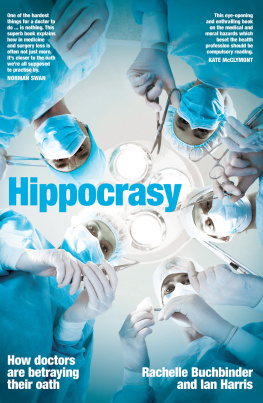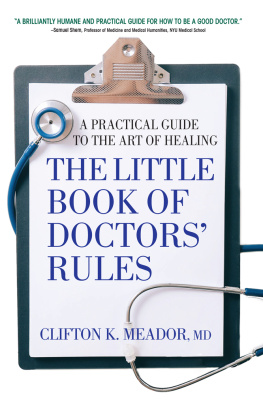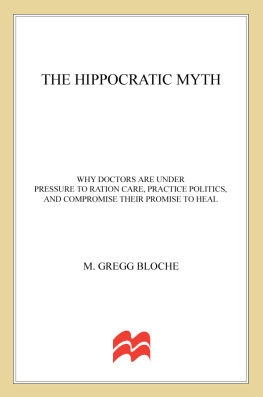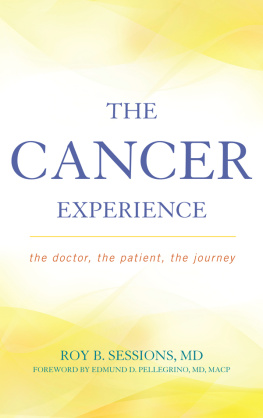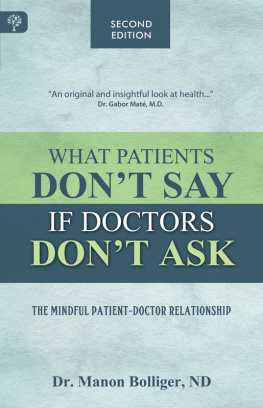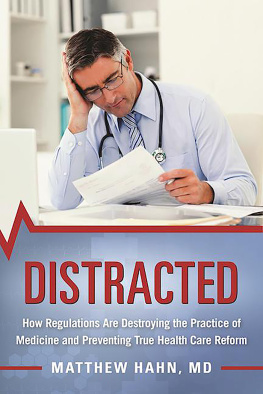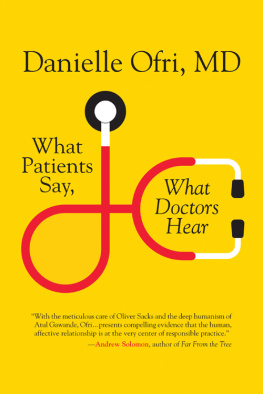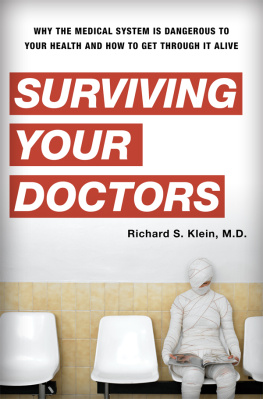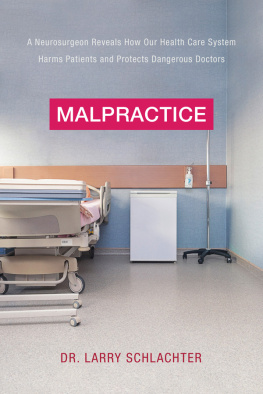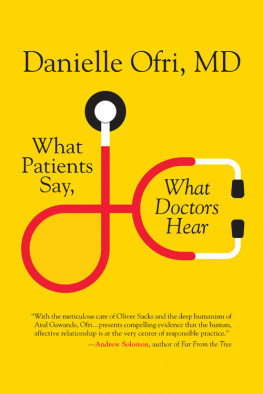Contents
Page List
Guide

One of the hardest things for a doctor to do is nothing. This superb book explains how in medicine and surgery less is often not just more, its closer to the oath were all supposed to practise by.
Norman Swan, award-winning producer and broadcaster of the
Health Report and Coronacast
This eye-opening and enthralling book on the medical and moral hazards which beset the health profession is a must-read for patients and practitioners alike. From tooth-fairy science to medical disasters to the inflated business world of medicine, Hippocrasy is a profoundly thought-provoking and compelling work that challenges our perception of the practice of modern medicine.
Kate McClymont AM, award-winning investigative journalist for the Sydney Morning Herald/The Age
Doctors are educated to do good. Yet, as the commercial imperatives of the medical industrial complex tighten their grip, doctors are becoming more and more worried that they are inflicting harm rather than creating benefit. This book is for them and, perhaps even more importantly, for their patients. The road to hell is paved with good intentions: read Hippocrasy and turn back.
Iona Heath CBE, former President, The Royal College of General Practitioners
This brilliant book offers clear and compelling evidence that were all at risk from too much medicine. Using the best of science, these two respected doctors blow the whistle on harmful healthcare. Buchbinder and Harris reveal how overdiagnosis, overtreatment and the medicalisation of normal life are major threats to human health. But this brilliant book also brings hope that we can wind back the harm and waste of unnecessary tests and treatments, and focus more on the great benefits medicine has to offer.
Ray Moynihan, author of Too Much Medicine? and Selling Sickness, Assistant Professor, Bond University
About half of us in advantaged countries are now patients or providers, or both, and a third of clinical interventions are futile at best. Seeking health is daunting and we could benefit from a guide. Rachelle Buchbinder and Ian Harris have provided such with this volume.
Nortin M Hadler, author of The Last Well Person, The Citizen Patient and Worried Sick, Emeritus Professor of Medicine and Microbiology/Immunology, University of North Carolina
Throughout medical history, doctors have routinely ignored the fundamental Hippocratic injunction: First, do no harm. Most of their treatments produced lots of harms, with little or no benefit. This wonderful book punctures the hyped claims of modern medicine, showing that it is not nearly as scientific, safe, effective, and honest as it should be. Reading Hippocrasy is essential for doctors (to help make them become more cautious); but even more essential for patients (to help them become more self-protective).
Allen Frances, author of Saving Normal, Professor and Chairman Emeritus of the Department of Psychiatry and Behavioral Sciences, Duke University School of Medicine
A timely book from two leading doctors. They present evidence that despite medicines lip-service to evidence-based medicine, many unnecessary, wasteful and harmful investigations and treatments abound. Increasingly, the healthy are re-defined as having predisease and drawn into questionable investigations and monitoring programmes. The books core message is that medicines hubris and a creeping scientism has come to overshadow the doctors commitment to care for and comfort their patients and, above all, do no harm. It is time to step back from the brink and revisit the founding principles and core values of our profession.
Trish Greenhalgh OBE, Professor of Primary Care Research, University of Oxford
This book is dedicated to our parents, without whom we would not have had the opportunity, motivation or ability to write this book, as well as to those who search for knowledge, rather than assume it.
A NewSouth book
Published by
NewSouth Publishing
University of New South Wales Press Ltd
University of New South Wales
Sydney NSW 2052
AUSTRALIA
newsouthpublishing.com
Rachelle Buchbinder and Ian Harris 2021
First published 2021
This book is copyright. Apart from any fair dealing for the purpose of private study, research, criticism or review, as permitted under the Copyright Act, no part of this book may be reproduced by any process without written permission. Inquiries should be addressed to the publisher.
 | A catalogue record for this
book is available from the
National Library of Australia |
| ISBN | 9781742237350 (paperback) |
| 9781742238265 (ebook) |
| 9781742239156 (ePDF) |
Internal design Josephine Pajor-Markus
Cover design Peter Long
Cover image Shutterstock
All reasonable efforts were taken to obtain permission to use copyright material reproduced in this book, but in some cases copyright could not be traced. The authors welcome information in this regard.
This book is printed on paper using fibre supplied from plantation or sustainably managed forests.

Contents
The Hippocratic Oath
Modern version by Louis Lasagna, 1964
I swear to fulfil, to the best of my ability and judgment, this covenant:
I will respect the hard-won scientific gains of those physicians in whose steps I walk, and gladly share such knowledge as is mine with those who are to follow.
I will apply, for the benefit of the sick, all measures which are required, avoiding those twin traps of overtreatment and therapeutic nihilism.
I will remember that there is art to medicine as well as science, and that warmth, sympathy, and understanding may outweigh the surgeons knife or the chemists drug.
I will not be ashamed to say I know not, nor will I fail to call in my colleagues when the skills of another are needed for a patients recovery.
I will respect the privacy of my patients, for their problems are not disclosed to me that the world may know. Most especially must I tread with care in matters of life and death. If it is given me to save a life, all thanks. But it may also be within my power to take a life; this awesome responsibility must be faced with great humbleness and awareness of my own frailty. Above all, I must not play at God.
I will remember that I do not treat a fever chart, a cancerous growth, but a sick human being, whose illness may affect the persons family and economic stability. My responsibility includes these related problems, if I am to care adequately for the sick.
I will prevent disease whenever I can, for prevention is preferable to cure.
I will remember that I remain a member of society, with special obligations to all my fellow human beings, those sound of mind and body as well as the infirm.
If I do not violate this oath, may I enjoy life and art, respected while I live and remembered with affection thereafter. May I always act so as to preserve the finest traditions of my calling and may I long experience the joy of healing those who seek my help.

